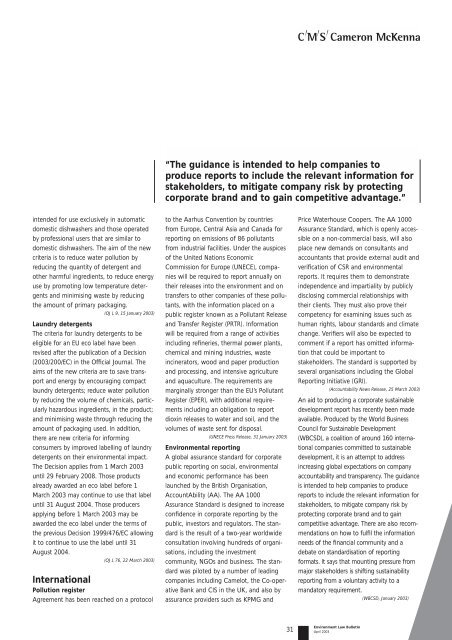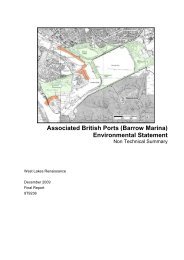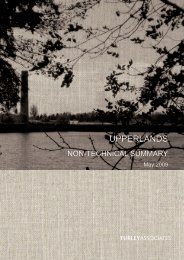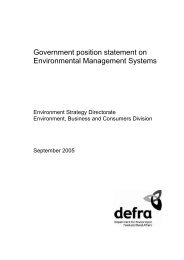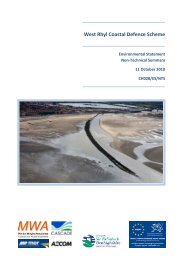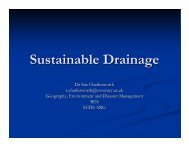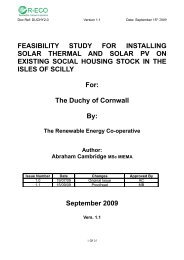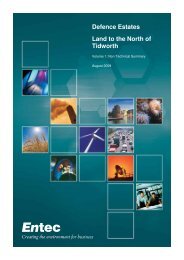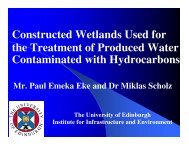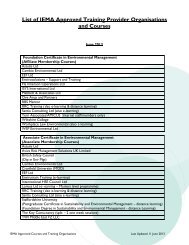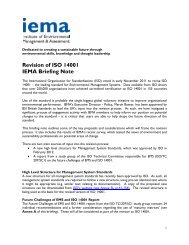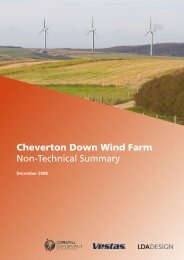Environment Law Bulletin - Institute of Environmental Management ...
Environment Law Bulletin - Institute of Environmental Management ...
Environment Law Bulletin - Institute of Environmental Management ...
You also want an ePaper? Increase the reach of your titles
YUMPU automatically turns print PDFs into web optimized ePapers that Google loves.
“The guidance is intended to help companies toproduce reports to include the relevant information forstakeholders, to mitigate company risk by protectingcorporate brand and to gain competitive advantage.”intended for use exclusively in automaticdomestic dishwashers and those operatedby pr<strong>of</strong>essional users that are similar todomestic dishwashers. The aim <strong>of</strong> the newcriteria is to reduce water pollution byreducing the quantity <strong>of</strong> detergent andother harmful ingredients, to reduce energyuse by promoting low temperature detergentsand minimising waste by reducingthe amount <strong>of</strong> primary packaging.(OJ L 9, 15 January 2003)Laundry detergentsThe criteria for laundry detergents to beeligible for an EU eco label have beenrevised after the publication <strong>of</strong> a Decision(2003/200/EC) in the Official Journal. Theaims <strong>of</strong> the new criteria are to save transportand energy by encouraging compactlaundry detergents; reduce water pollutionby reducing the volume <strong>of</strong> chemicals, particularlyhazardous ingredients, in the product;and minimising waste through reducing theamount <strong>of</strong> packaging used. In addition,there are new criteria for informingconsumers by improved labelling <strong>of</strong> laundrydetergents on their environmental impact.The Decision applies from 1 March 2003until 29 February 2008. Those productsalready awarded an eco label before 1March 2003 may continue to use that labeluntil 31 August 2004. Those producersapplying before 1 March 2003 may beawarded the eco label under the terms <strong>of</strong>the previous Decision 1999/476/EC allowingit to continue to use the label until 31August 2004.(OJ L 76, 22 March 2003)InternationalPollution registerAgreement has been reached on a protocolto the Aarhus Convention by countriesfrom Europe, Central Asia and Canada forreporting on emissions <strong>of</strong> 86 pollutantsfrom industrial facilities. Under the auspices<strong>of</strong> the United Nations EconomicCommission for Europe (UNECE), companieswill be required to report annually ontheir releases into the environment and ontransfers to other companies <strong>of</strong> these pollutants,with the information placed on apublic register known as a Pollutant Releaseand Transfer Register (PRTR). Informationwill be required from a range <strong>of</strong> activitiesincluding refineries, thermal power plants,chemical and mining industries, wasteincinerators, wood and paper productionand processing, and intensive agricultureand aquaculture. The requirements aremarginally stronger than the EU’s PollutantRegister (EPER), with additional requirementsincluding an obligation to reportdioxin releases to water and soil, and thevolumes <strong>of</strong> waste sent for disposal.(UNECE Press Release, 31 January 2003)<strong>Environment</strong>al reportingA global assurance standard for corporatepublic reporting on social, environmentaland economic performance has beenlaunched by the British Organisation,AccountAbility (AA). The AA 1000Assurance Standard is designed to increaseconfidence in corporate reporting by thepublic, investors and regulators. The standardis the result <strong>of</strong> a two-year worldwideconsultation involving hundreds <strong>of</strong> organisations,including the investmentcommunity, NGOs and business. The standardwas piloted by a number <strong>of</strong> leadingcompanies including Camelot, the Co-operativeBank and CIS in the UK, and also byassurance providers such as KPMG andPrice Waterhouse Coopers. The AA 1000Assurance Standard, which is openly accessibleon a non-commercial basis, will alsoplace new demands on consultants andaccountants that provide external audit andverification <strong>of</strong> CSR and environmentalreports. It requires them to demonstrateindependence and impartiality by publiclydisclosing commercial relationships withtheir clients. They must also prove theircompetency for examining issues such ashuman rights, labour standards and climatechange. Verifiers will also be expected tocomment if a report has omitted informationthat could be important tostakeholders. The standard is supported byseveral organisations including the GlobalReporting Initiative (GRI).(Accountability News Release, 25 March 2003)An aid to producing a corporate sustainabledevelopment report has recently been madeavailable. Produced by the World BusinessCouncil for Sustainable Development(WBCSD), a coalition <strong>of</strong> around 160 internationalcompanies committed to sustainabledevelopment, it is an attempt to addressincreasing global expectations on companyaccountability and transparency. The guidanceis intended to help companies to producereports to include the relevant information forstakeholders, to mitigate company risk byprotecting corporate brand and to gaincompetitive advantage. There are also recommendationson how to fulfil the informationneeds <strong>of</strong> the financial community and adebate on standardisation <strong>of</strong> reportingformats. It says that mounting pressure frommajor stakeholders is shifting sustainabilityreporting from a voluntary activity to amandatory requirement.(WBCSD, January 2003)31<strong>Environment</strong> <strong>Law</strong> <strong>Bulletin</strong>April 2003


